At Lush we work in an industry where the packaging costs the customer more than the product. Now, the customer needs to worry about how to recycle something they didn’t want to buy in the first place. This seems like a raw deal to us. If we can cut out all the plastic packaging, we can give our customers better value for money.
of our all year round range is naked
Smell that? It’s the scent of products without their packaging on. That’s right, 30 years of smelling us before you see us is rooted in our naked principle.

Why Go Naked?
Globally, around 120 billion pieces of beauty packaging are disposed of every year. 95% of cosmetic packaging is thrown away and out of the 14% of packaging that makes it to a recycling plant, only 9% of it is recycled, the rest going to landfill. It is glaringly obvious that packaging is one of the biggest sustainability issues facing the cosmetics industry today and it is our responsibility as a cosmetics brand, to limit this impact as much as we can. As the cosmetics industry becomes more and more environmentally conscious, innovative packaging that can be disposed of in less damaging ways is becoming more accessible. However, what if we eliminated the need for packaging all together? This is the challenge we pose to our inventors and R&D teams, whose legacy has given us the shampoo bar, massage bar, naked deodorant, henna brick, naked body conditioner, naked shower gel and more soap than you could ever dream of.
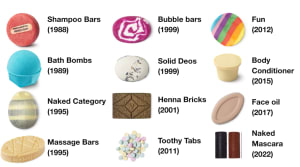
Naked products tend to last longer than their packaged counterparts because they are more concentrated and have minimal water content. Our estimations tell us that one shampoo bar will last the same as three 200ml bottles of liquid shampoo. Not only are we saving those three bottles worth of plastic, we are also having to ship less product and less weight, reducing our C02 emissions. One truck load of shampoo bars is an estimated total of 800,000 washes. If we were to transport the same amount of washes in the form of a liquid shampoo, that would take 15 trucks to deliver to our stores.
Just to note, these estimates are based on measurements we have done ourselves. To collect this data, we handed shampoo bars to up to sixty people, collected the starting weight of the shampoo bar, asked our volunteers to wash their hair ten times with the bar they were given and send the bar back to us so we could weigh the bar after it had been used. We then worked out how much of the bar was used per wash and collected the average depletion across all our volunteers. We found that there was quite a range between our volunteers and the bar would last some people a much longer time than others depending on hair length, how they used the bar and how they stored it.
We’d like to strengthen this study with a larger sample size to improve the quality of our analysis, but in the meantime we’re confident that on the whole shampoo bars replace multiple plastic bottles worth of liquid shampoo!
Challenges of Making Naked Products
Our initial interest in making naked products was born out of necessity. After the demise of Cosmetics To Go, the Lush co-founders simply didn’t have the money to invest in packaging, but this actually sparked a revolutionary approach to a growing industry problem. One of the challenges of selling naked products is ensuring we comply with cosmetics regulations that enforce what information must be available to customers at the point of purchase. We ensure that our naked products have easily accessible signage that provides the necessary information that you would usually find on a packaged product, such as quantitative ingredients information. Our in-store signage is made from recyclable polypropylene, the same material as our black pots. This can be returned to our Green Hub at the end of life to be chipped down and recycled for new purposes. We can also print this information on a scale label sticker at the point of sale for customers to take away with them, in recyclable paper bags or greaseproof paper.
All our naked products are assessed against Food Imitation Criteria to ensure customers won’t take a bite out of them. Should a product simply look too tasty, it will be reformulated or our perfumers will add a bitter-tasting material to ensure someone won’t go back for seconds.
Another challenge for us creatively has been approaching more regulated or complex products, such as oral care and makeup. When we can’t do it naked, we opt for low packaging instead. But constant innovation behind the scenes has led to surprising breakthroughs. Where else on the high street can you find naked mascara?
Naked products also need to go hand in hand with great customer service. These types of solid, unpackaged products might not look familiar to the customer, so we pride ourselves on introducing these product to customers, showing them how to use them and the effects they have on the skin and hair. Our customer service strategy has always been to really listen to our customers’ needs and lifestyle, encourage them to try products in-store to check they are right for them and to sample generously.
We believe that providing a personal service is one of the best environmental practices we can offer. If we can find the right product for every customer, they get really good value for money, we get regular customers, the consumption of unneeded products falls and money and resources are no longer wasted.
How many of you have unused products sitting in your bathrooms? Because when you got home you found that product isn’t what you hoped for, or it doesn’t suit your skin, hair or lifestyle. You end up with bathroom cabinets, window sills and shelves full of unwanted stuff, on its way to landfill. When we make products for every need, everyone is able to buy exactly what’s required and ultimately reduce waste
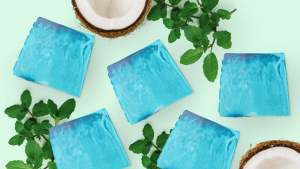
Examples of Naked Innovation
Our most widely known naked product has to be the shampoo bar. The shampoo bar was accidentally, and now famously, invented by Mo Constantine and Cosmetic Chemist Stan Krysztal, in Mo’s garage in 1987. It began after Stan showed Mo a new type of soap that he was working on. Stan had nicknamed this his “worm soap”, so-called because he was playing around with synthetic detergent noodles and had the idea of using hand presses to squeeze the noodles into shape. Mo joined him in his experiments, but suggested he swap out the synthetic noodles for some surfactant needles. They were disappointed to discover that the product had the wrong consistency of lather for soap… until Mark pointed out that what they had created was in fact a brand new product, the solid shampoo bar. Each bar was the perfect base for all the lovely ingredients that they wanted to deliver gently to the hair and scalp. Once Mo and Stan realised what they had created, the possibilities were limitless.
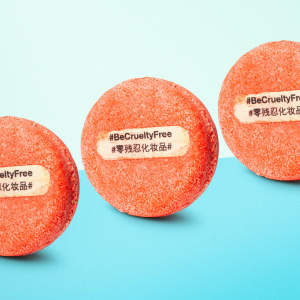
We have been selling naked products even in the years before Lush, when we were known as Cosmetics To Go. The mail order company would send out catalogues filled to the brim with exciting bath bombs, bubble bars, bath oils, soaps, massage bars and the now famous shampoo bar, all without packaging. After the demise of Cosmetics To Go, the founders created Lush, and went back to basics, stripped away the packaging and put highly knowledgeable staff on our shop floor to help recommend the perfect product for our customers.
Other notable naked products include Aromaco, our first naked deodorant invented by Helen Ambrosen in 1999.
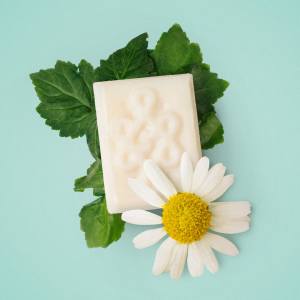
Helen was also responsible for the invention of the solid Henna brick, revolutionising a previously liquid hair colour formula by adding cocoa butter to the mix and leaving it to set in a mould reminiscent of long ago tea bricks. This ingenious move created a solid product that could then be sold naked, which proved to be a lot more popular with our customers and has remained a cult Lush product ever since.
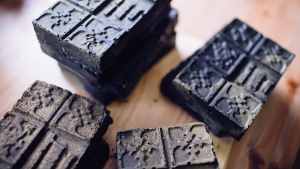
Other notable naked inventions include makeup. We made refillable lipsticks that swapped individual containers for a coating of peelable wax to protect the colour inside. This could then be peeled off and the lipstick inserted into any empty lipstick container you had in your collection, not only saving our customers from buying packaging by also saving them from throwing another piece of packaging out. Then there’s naked mascara, formulated with butters and waxes to create an iconic, solid product. These are cylindrical blocks of coloured product with a hole through the middle, which you use by wetting the mascara wand, rubbing it inside the product where it will pick up mascara for you to then apply to your lashes. This has become a favourite product for our customers and has won multiple awards such as the 2022 UK Sustainable Beauty Awards for Sustainable Product, the 2023 NA Harper’s Bazaar Beauty Icons Awards for Most Innovative Beauty Product and the 2024 Australia Sustainability Awards for the Product Award.

One day Helen arrived in the garden with a tray of deodorant she’d made filled with sunflowers like a Van Gogh painting. That was the start of Aromaco.
Naked Stores
In 2018 we made our biggest stance yet by opening two naked-only concept stores in Milan, Italy and Berlin, Germany. Every single product sold in these stores was unpackaged. We had all our naked bath products, shampoo and conditioner bars, naked hot oil hair treatments, naked body scrubs and conditioners, naked shower gel, soap, massage bars, washcards, our naked makeup and some exclusive naked products. We pressed our iconic fresh cleansers into coin shapes which customers could take and pop it in their own pot. We also sold packaging that would help our customers store their naked products such as our Knot Wraps and our cork pots, another answer to cutting plastic packaging and replacing it with compostable, water resistant and carbon sequestering cork.

Our Lush Lens technology was launched alongside our naked stores to help customers identify and read about naked products (if you’ve read the Digital Ethics principle, you know what we’re talking about). This digital packaging solution eradicates the need for packaging and signage and we believe it has the potential to revolutionise the packaging industry at large. We continued full steam ahead in 2019 and opened another two naked stores in Manchester, UK and in Hong Kong.
Staff at the opening of the Manchester store volunteered to wear nothing except a black apron that read ‘Ask me why I’m naked’. Our naked stores also received the Champion of Sustainability award in The Vogue Beauty Awards in 2019.

Knot Wraps
Knowing that we could do so much to reduce waste when it comes to our products, we also wanted to bring this thinking to how we approach gifting. Our seasonal ranges have always been extremely popular (did someone say Snow Fairy?) and, in 2009, we started playing with more reusable and circular approaches to gift wrap. In our Christmas 2009 range we launched our first collection of vintage scarves, which we called Knot Wrap.
Knot Wraps are inspired by furoshiki, an ancient Japanese tradition, that uses techniques similar to origami, to wrap gifts in meaningfully decorated fabrics. In Japan, the furoshiki can either be kept or returned with a small gift inside to say thank you, and if kept it’s likely the furoshiki will be used again as gift wrapping, or for other day-to-day uses such as a small bag or wrapping for a lunch box. We take inspiration from furoshiki to promote a circular form of gift wrapping. If you pass forward this tradition to your family and friends, the cloth can be kept within your community and used over and over again.
Knot Wraps, therefore, are a perfect solution to gift wrapping naked items. Rather than using single use materials to carry or gift your products, a Knot Wrap provides a reusable, sustainable solution while maintaining the fun of patterned wrapping paper.
Our own design Knot Wraps are made from two different materials.
- One is 100% recycled polyester which is made from recycled drink bottles that are washed, crushed, chipped and then melted into a fine spinneret which extrudes the plastic into yarn.
- The other is 100% organic cotton, which is grown without the use of artificial pesticides and fertilisers, leaving the soil, air and water free from contamination, which is also beneficial for pollinators and local communities.
We love working with a diverse range of artists with lots of different backgrounds to curate a gallery-like collection that tells a multitude of stories for many different occasions. We also have the vintage Knot Wraps that were the first to launch that Christmas in 2009 and we continue to sell today. They are sorted and graded by our supplier and the best are sent to our stores to be used from wrapping.
To add an extra level of circularity, we have also implemented the Knot Wrap Swap scheme which allows customers to swap pre-loved Lush branded wraps in exchange for 50% off a different Lush design of the same size or smaller. The wraps you exchange are all laundered and then resold, meaning more wraps can be passed forward, get more uses, and avoid ending up in landfill.

What Have We Done This Year?
In recent years, we have focused some of our attention on collaborating with carefully selected partners to bring super fan communities together, reaching new audiences and creating exciting experiences to spread our message to leave the world lusher than we found it. For Plastic Free July 2023, we took advantage of our collaboration with SpongeBob SquarePants to highlight our naked products with a new fanbase. We collaborated with Paramount on SpongeBob: Operation Sea Change, which featured a range of 100% plastic free products alongside global beach clean ups and activities for children. Our July Kitchen Box featured plastic-free products that were exclusively Spongebob themed. We also created a game in our Lush App called the Bikini Bottom Trash Dash and hosted real life Trash Dash (litter picks) in Brighton and Bournemouth.
In FY2024, we had just under 700 different products in our all year round (AYR) range. These are products that we sell for the entirety of the year, whereas seasonal and limited edition products can come and go for shorter periods of time. Of these nearly 700 AYR products, 45% of them were Naked. These naked products also made up 54% of our sales for the financial year, which generated just over 32% of our net sales value. If we also include our seasonal products for FY2024, we have a total of 957 products, 49% of which were naked. Just under 60% of our sales were naked products, which generated 39% of our net sales value. These calculations do not consider the sales of our gifts, sundries, knot wraps and experiences.
Further reading →
12:11






